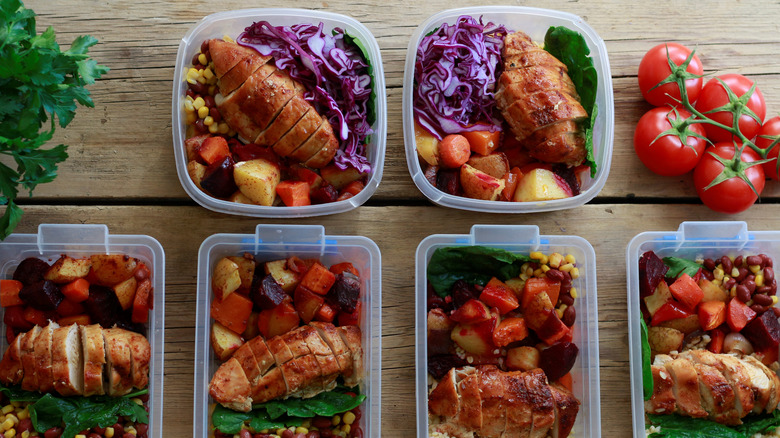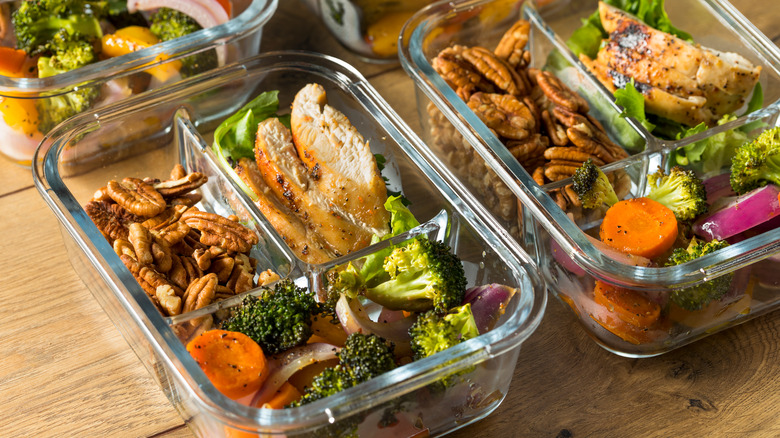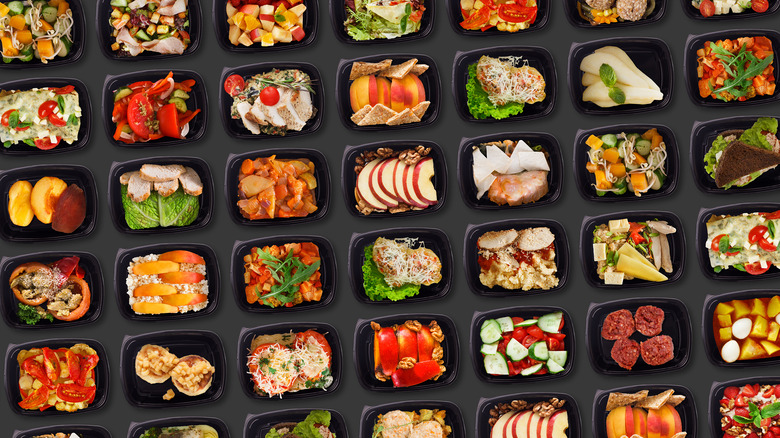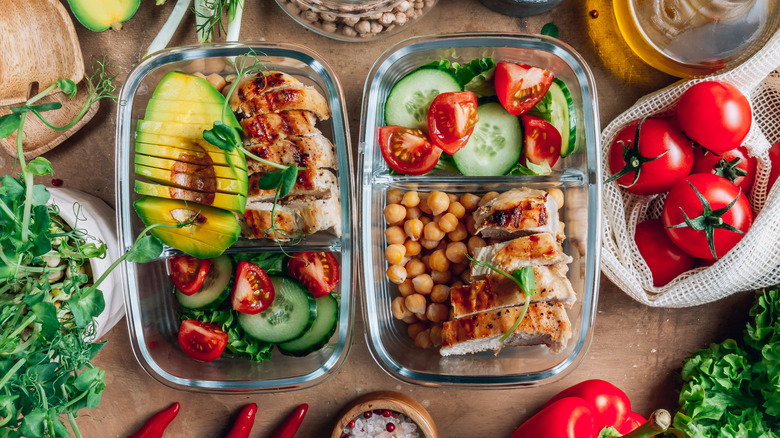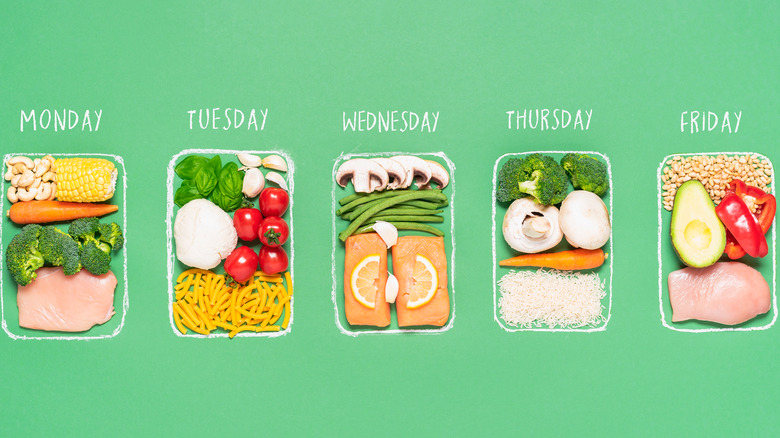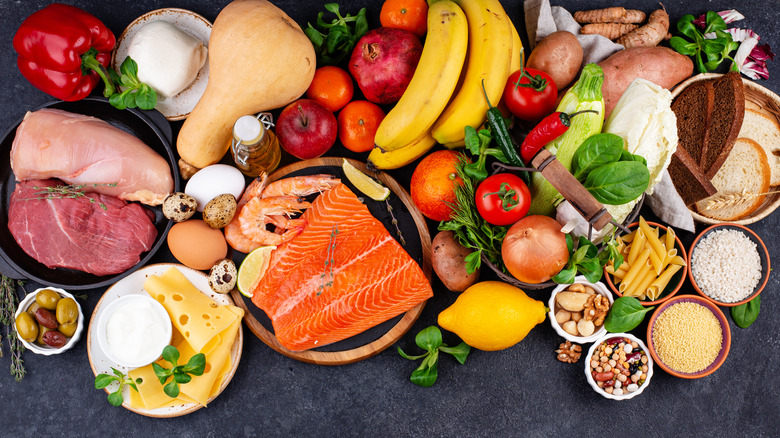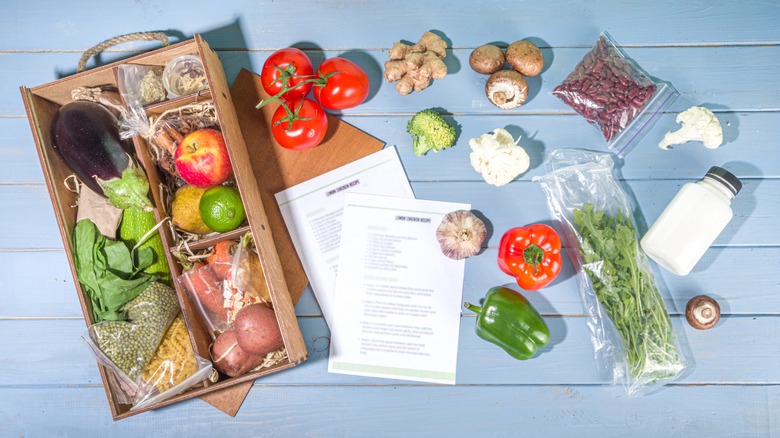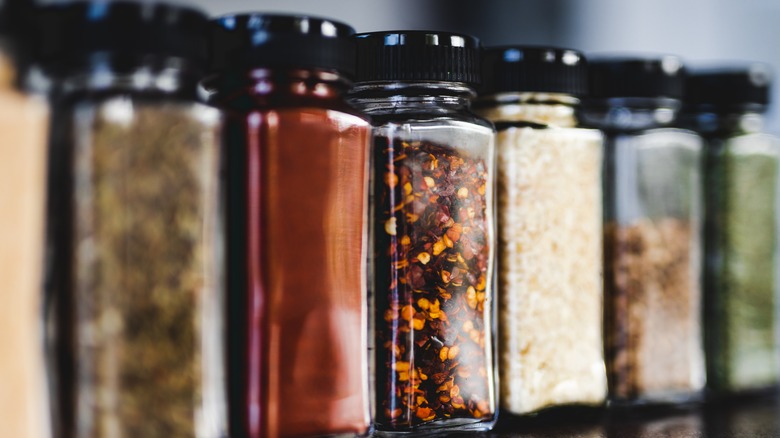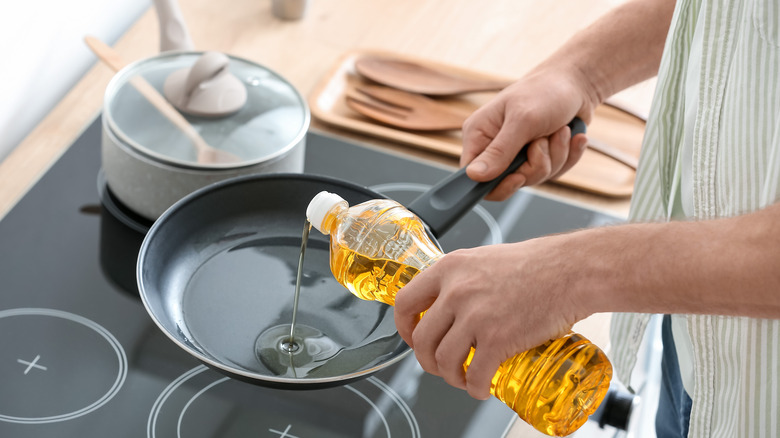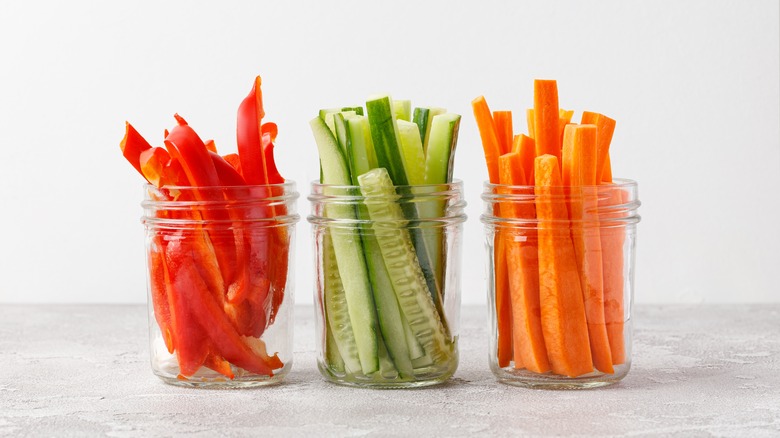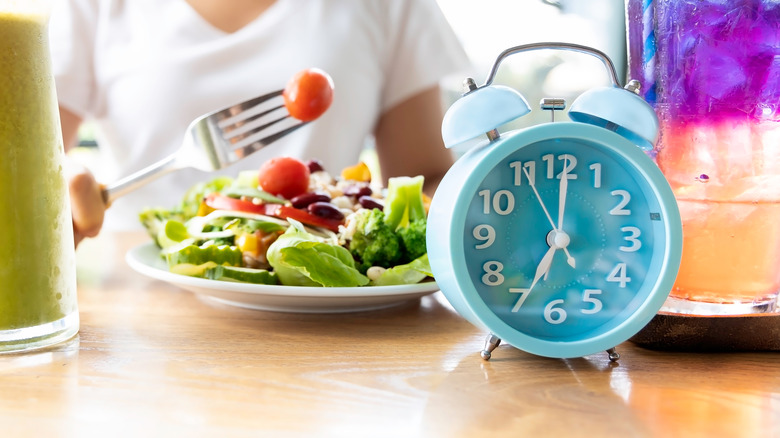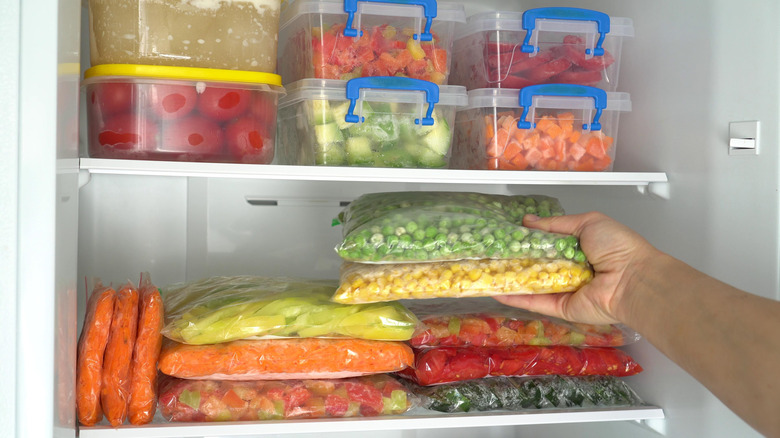14 Common Mistakes Everyone Makes With Meal Prep
Do you want to get organized, eat healthier, and save resources? Then start planning your meals each week. Prepping food ahead of time is a great way to take control of your diet and save time. There are a lot of other benefits to meal planning: You can make personalized dishes, eliminate impulse purchases, and reduce food waste. Taking time each week to prep and cook food may seem overwhelming at first, but it's easier than you might think.
Like many things in life, the key to successful meal planning is to get organized. Start by taking inventory of your kitchen: Which items do you keep stocked? What ingredients do you have but never use? Clean out the cupboards, throw out expired foods, and make room to stock up on your favorite essentials. Next, make a list of breakfast, lunch, or dinner recipes and start a shopping list. Once you have your ingredients, you can start putting your dishes together. But as you start your journey, you'll want to avoid some of these common mistakes everyone makes with meal prep.
1. Batch cooking just one dish
Batch cooking is a form of meal prep where you prepare one large amount of a meal that can be eaten over the next several days. While, in theory, it seems like a grand idea, the reality is that most people do not enjoy indulging in the same thing for days in a row, even when it's a favorite recipe. This is a common mistake everyone makes when they start meal prepping, but luckily, it's an easy fix.
The best way to avoid food burnout is to make several different recipes at the same time and put half of each in the freezer, with the other half in the refrigerator to eat during the week. This takes more upfront labor — imagine making three recipes in one afternoon — but in the long run, you save your future self time by having a backup in the freezer for the next week or month. Doing this weekly will ensure you always have something for dinner.
Another way to avoid food boredom is to prep ingredients that can work with several meals. For example, roasted vegetables make a great side dish: Throw them on a bed of greens for a hearty salad or wrap them in a tortilla for a quick burrito.
2. Preparing too much
When you're getting started on meal planning, it is easy to get overly ambitious and prepare too much food, leading to waste. According to FoodPrint, most food waste happens in home kitchens, where over-preparing and poor planning are the predominant causes. Spoiled ingredients rot in landfills to create greenhouse gases — unless you are composting, which only 27% of U.S. households have access to do so (via Green Biz).
Home chefs can be part of the solution by putting some extra thought into meal prepping to avoid making too much. Plan each week with a little wiggle room. For example, leave space in your weekly menu for leftovers. It's easy to overestimate how much food you will eat during the week and not account for company lunches or last-minute dinners with friends or family. As much as we plan our meals, things often come up unexpectedly, and your carefully packed dishes might end up sitting in your refrigerator longer than you expected.
3. Sticking with the same protein
One surefire way to get bored with your meals is by using the same meat — we're looking at you, chicken. Chicken is a popular protein staple in meal prep; it's versatile and can be grilled, boiled, baked, steamed, and added to many dishes, so it's easy to get in a rut. But trying a new protein can keep you from being bored with your own cooking.
Try making new recipes with the old classics: beef and pork. Or, visit your local butcher or farmer's market and see what's fresh; many places will also carry venison and bison. If you are an adventurous eater, try experimenting with less common meats like liver, tripe, or even tongue. These proteins aren't as popular in an American diet but are safe to eat and consumed regularly in other parts of the world.
You can also make delicious vegetarian meals with plant-based proteins like lentils, beans, and quinoa, which are easy to prep and make a satisfying meal.
4. Not customizing your meals
An important step when planning your weekly meals is customizing your dishes to your diet. Many home chefs new to food prep often make the mistake of trying to follow a pre-designed menu from their favorite website or magazine without taking into consideration their personal tastes.
Customizing your meals is as simple as making a list of what you and your family will eat. If you have any special dietary requirements, like being restricted to gluten-free or vegetarian-friendly foods, note that the weekly menu must represent what will satisfy everyone. You might like the idea of making a big salad each week, but in reality, you will be the only one eating it; the rest of your family may not eat salad even though it's good for them. So, no matter how much you want them to get more greens in their diet, you need to be realistic in meal planning and ensure everyone's needs and tastes are being met.
5. Only meal prepping once a week
While many home chefs meal plan for the week on Sundays, one day a week is not sufficient for food prep. Foods stored in the refrigerator will start to go bad and grow bacteria in around three to four days (via Mayo Clinic). The best way to avoid this is to prep a couple of days a week to ensure dishes don't sit for too long in the refrigerator. For example, cook on Sundays and Thursdays to guarantee fresh meals. You can also freeze portions to ensure food is always available. According to the FDA, prepared foods have a longer life in the freezer; for example, most soups and stews will last for two to three months.
Meal prepping more than just one day a week also allows you to create various dishes. And since some foods do not freeze well, like pasta and rice, you can mix and match to make the most of your freezer space and time. The best meals to freeze are dishes like burritos, meatballs, tuna patties, soups, and casseroles. You can even portion them before storing them for an easy individual meal. Items like meatballs and patties can be frozen covered and on a baking sheet, but remember to transfer them to a freezer bag to prevent them from sticking together.
6. Not making balanced meals
The classic food pyramid has changed over the years, but the importance of a balanced diet has not. A complete diet supplies all of the nutrition your body needs, with vitamins and minerals from fresh fruit, vegetables, protein, and carbohydrates. If your regular eating habits are lacking in any area, you risk a weakened immune system and getting sick (via healthline).
And while we all know how important it is to eat a balanced diet, it's not always easy in practice. So when planning your meals, it's worth double-checking your food prep to ensure you are creating a balanced menu. Does your meal plan have enough leafy greens? Are you eating enough colorful vegetables like peppers and carrots? If you prep with nutrition in mind, you should be able to incorporate a mix of foods to keep you healthy and your hunger satisfied.
According to Nourish, eating fruits and vegetables in season is one way to keep a varied and balanced diet. For example, eat mandarins and sweet potatoes in the winter, asparagus and radishes in the spring, cucumbers and peaches in the summer, and bell peppers and green beans in the fall.
7. Meal prepping new recipes
Are you a home chef that gets excited about trying new recipes? Making meals you've never had before is a fun way to be creative in the kitchen. However, that shiny new dish might need a few tweaks before it's ready for a weekly rotation.
You don't want to spend the time and money preparing a meal you think you will like but have never actually made before. After all, recipes and tastes vary; whenever you try a new one, you will want to customize it to your palate with maybe a little extra garlic, less salt, or more spice. So, until you have the dish down and know your favorite variation of it, don't add it to your weekly prep.
Meal planning works best with things you know you and your family will eat, so stick to family favorites and prepare staples like chicken and vegetable stir fry or beef enchiladas, and save the new recipes for when you're not making a large batch.
8. Forgetting the seasoning
The right spices can take a bland meal to another level. Many home chefs don't measure seasonings; instead, they sprinkle a pinch or two of this or that. And while you may be able to eyeball your spices for dinner for two, batch cooking is more difficult to gauge ratios and add the right amount. So it is important to pay attention to exact measurements in the recipe to ensure you aren't over or under-seasoning your foods.
Marinating your proteins for meal prep is an excellent way to season them. Since salt tends to dry meat like chicken and steak, a marinade can keep them juicy. Dry rubs are another option to flavor proteins and are available in different blends of herbs and spices.
A simple squeeze of lemon on a prepared meal that has been sitting in the refrigerator for a couple of days is another way to liven up a pre-made dish; the acid adds a burst of bright, fresh flavor.
9. Using too much oil
Another common mistake in meal planning is over-oiling your food. While most proteins need to be cooked in some kind of fat, too much oil mixed with the fat sitting in the refrigerator turns into a cold, gelatinous goo. Prepped meals live in the fridge for a few days, so ensuring they are still appetizing on day three is an important part of the process.
The best way to avoid over-oiling your dishes is to use less oil. You can try different cooking methods like air frying or baking. You can steam and saute ingredients in white wine or broth and use flavorful marinades to infuse flavor without excessive fat. According to WebMD, you can partially replace oil in marinades with white wine.
Over-oiling applies to salads and veggies too. You should always meal prep salads without the dressing to keep them fresh and crisp. You can pat down sauteed and roasted vegetables with a paper towel to absorb excess oil before you place them in containers.
10. Not considering snacks
Snack time is the best time of the day — a snack is a nourishing little treat to keep you going until the next meal. But many newcomers forget to plan for them when organizing their weekly dishes. Everyone needs a snack during the day, and a hungry belly makes poor choices. According to healthline, snacks can help control hunger throughout the day and eliminate the impulse to eat excessive calories. So don't forget to prep these morsels accordingly and have plenty of healthy options available.
An easy way to prepare snacks is to put together small bags of things like granola, dried fruit, cheese, crackers, or nuts for easy grab-and-go. Everyone is busy, and between work, school, and other activities, having a portable treat is the best way to keep energy levels up throughout the day. If you are looking for a more filling snack, hard-boiled eggs are an excellent source of protein (via myfitnesspal). Make a weekly batch and keep them in the refrigerator when you need a healthy, protein-rich morsel. Just throw a hard-boiled egg in a sandwich bag on your way out the door — no other packaging required.
11. Using the wrong containers
Packaging is a big part of meal planning. Since your pre-made homemade dishes will be in containers, you should choose your vessels carefully.
The first thing to consider is the material: Plastic containers are durable and lightweight. The glass variety is also durable, but they are more expensive, heavier, and, of course, breakable. You should also think about the quality and use of the vessel. The ideal container should be microwave-safe and have a tight-fitting lid that is leak-proof. It should also stack easily and be dishwasher-safe. If you plan on freezing your prepped meals, you need freezer-friendly vessels like reusable silicone bags.
If you are planning dishes for the entire family, you might consider buying containers in bulk. Repurposing yogurt packaging or glass jars works too, and they are recyclable. However, you should steer clear of reusing foam containers because they are not only bad for the environment but also not microwave-safe.
12. Not getting the family involved
Meal prepping should be a family affair. It is a lot of work to plan for recipes, shop for ingredients, cook the dishes, and store them. So, if you are meal planning for the whole family, then it makes sense that they get involved and share duties. Plus, it's the perfect opportunity to spend time together with a common goal and teach teamwork.
Once a week, sit down to brainstorm the week's menu and let everyone have input. Get creative and explore new foods. You can connect meal planning to a school topic; for example, if your child is learning about the pyramids in Mexico, then incorporate a fun Mexican dish into your meal plan. Children will appreciate having a voice in what foods go on the table.
You can also share the shopping and chopping duties. Even if your kids don't have knife skills yet, they can still help portion and fill containers, shred cooked proteins, and wash dishes. According to The New York Times, children involved in the cooking process are more willing to try new foods, feel a sense of accomplishment, and develop an understanding of healthy eating.
13. Not using your time wisely
Meal planning takes time, and miscalculating the time it takes to make dishes is a common mistake during prep. When you are in the kitchen, give yourself plenty of time to boil, steam, and saute. Multitasking and making a few dishes at a time seems daunting, but if you are an organized home chef, you can get a lot done by following a couple of simple kitchen rules.
Practice mise en place, which means "putting in place." In meal prep, that means having your ingredients and all the kitchen tools you will need on the counter before you start. This will save you time and make the cooking process smoother. Another important kitchen rule is to clean as you go. There is built-in downtime in cooking, like when pasta is boiling or you are waiting for something to cool; always take advantage of those little breaks to wash pans and keep the dirty dishes from piling up. An organized kitchen is the key to having a successful meal prep and making the most of your time.
14. Having unrealistic expectations
When getting started on meal prep, it's essential to be realistic and make a plan that works for you and your family. Creating every meal, every day, is an unrealistic goal. Start with a more manageable one: For example, prepare dishes for the first half of the week. Once you have figured out what works for you and your family, follow that model. If there are extracurricular activities on certain nights, plan for those nights. Every family's meal prep schedule will look different, so don't beat yourself up and get overwhelmed if it seems impossible. Instead, focus on what you can do and how that will help save time and money.
Embarking on anything new takes time and practice, and it is important to have grace with yourself as you get the hang of something new. Cooking shouldn't be a chore; planning and making nutritious dishes is a form of self-care. According to Psychology Today, it's good for mental health and is an opportunity to be mindful and share with others. So, keep your meal plan realistic and enjoy your time in the kitchen.
